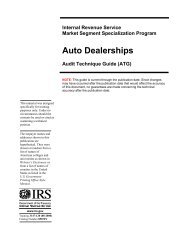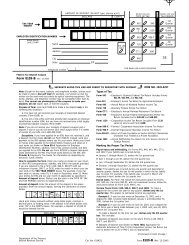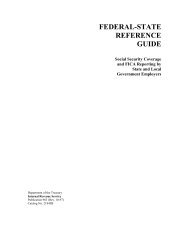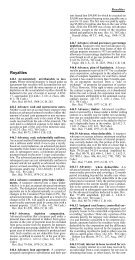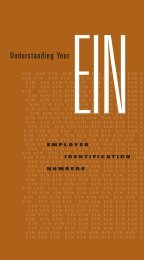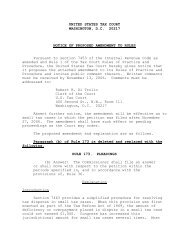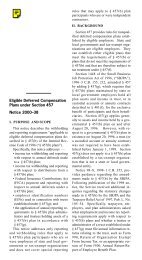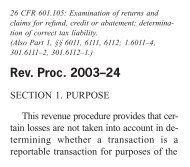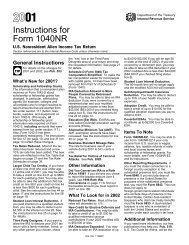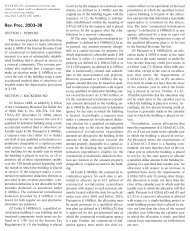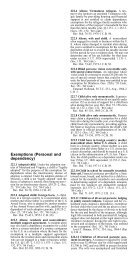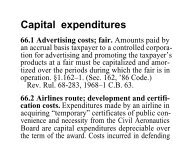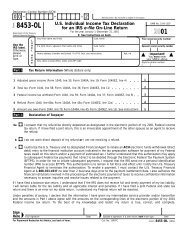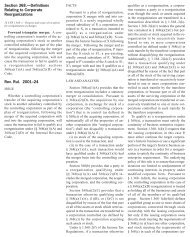Exempt organizations - Uncle Fed's Tax*Board
Exempt organizations - Uncle Fed's Tax*Board
Exempt organizations - Uncle Fed's Tax*Board
You also want an ePaper? Increase the reach of your titles
YUMPU automatically turns print PDFs into web optimized ePapers that Google loves.
218.264 Cooperatives; farmers; patronage<br />
dividends retained. The retention by farmers’<br />
cooperatives of each patronage dividend less than<br />
one dollar and similar retentions of the cents payable<br />
in excess of whole dollar amounts do not<br />
constitute inequitable treatment of all patrons to an<br />
extent which would jeopardize the exempt status<br />
of the cooperative. The mailing of checks or stock<br />
representing patronage dividends by a farmers’<br />
cooperative is payment, and deduction is allowed<br />
even though the postal authorities are unable to<br />
make delivery and the cooperative holds the<br />
instrument subject to the claim of the rightful<br />
wner. §39.101(12)–1. (Sec. 101, ’39 Code; Sec.<br />
501, ’86 Code.)<br />
Rev. Rul. 55-141, 1955-1 C.B. 337.<br />
218.265 Cooperatives; farmers; patron’s status<br />
as producer. Farm owners operating their<br />
farms through tenants are producers, and where<br />
the number of those operating their own farms and<br />
those operating through tenants constitutes substantially<br />
all of the membership of a cooperative<br />
association operating a creamery, such association<br />
is entitled to exemption. (Sec. 231(11), Revenue<br />
Act of 1924; Sec. 231(12), Revenue Act of 1926;<br />
Sec. 521, ’86 Code.)<br />
Farmers Co-operative Creamery, 21 B.T.A. 265,<br />
Acq., 1957-2 C.B. 4.<br />
218.266 Cooperatives; farmers; patron’s statusas<br />
producer. In general, a person who markets<br />
his products or purchases supplies through a cooperative<br />
organization may be considered a producer<br />
for purposes of section 521 if he bears the risks of<br />
production, cultivates, operates, or manages a<br />
farm for gain or profit as owner or tenant. Circumstances<br />
under which a person may be considered<br />
a producer are set forth. Amplified by Rev. Rul.<br />
72-589. §1.521-1. (Sec. 521, ’86 Code.)<br />
Rev. Rul. 67-422, 1967-2 C.B. 217.<br />
218.267 Cooperatives; farmers; patron’s status<br />
as producer; stockholder of corporation. A<br />
stockholder does not qualify as a producer exempt<br />
from tax solely because the corporation engaged<br />
in farming so qualifies; however, he may qualify<br />
if independent of his stock ownership he meets the<br />
requirements of a producer. Rev. Rul. 67-422<br />
amplified. §1.521–1. (Sec. 521, ’86 Code.)<br />
Rev. Rul. 72-589, 1972-2 C.B. 282.<br />
218.268 Cooperatives; farmers; processing<br />
semen for artificial breeding. A cooperative<br />
association that owns sire cattle for the purpose of<br />
producing and processing semen for use in the<br />
artificial breeding of its members’ livestock may<br />
qualify for exemption. §1.521-1. (Sec. 521, ’86<br />
Code.)<br />
Rev. Rul. 68-76, 1968-1 C.B. 285.<br />
218.269 Cooperatives; farmers; purchasing<br />
subsidiary. A corporation formed to purchase<br />
farm equipment for members of an exempt farmers’<br />
cooperative that holds all issued capital stock<br />
of the corporation satisfies the requirement that<br />
substantially all of its stock must be owned by producers.<br />
§1.521-1. (Sec. 521, ’86 Code.)<br />
Rev. Rul. 75-388, 1975-2 C.B. 227.<br />
218.270 Cooperatives; farmers; records and<br />
allocation requirements. A farmers’ cooperative<br />
marketing and purchasing association does not<br />
maintain records of the amount of business done<br />
with its marketing patrons separate from those<br />
pertaining to the amounts of business done with<br />
the purchasing patrons. The association apportions<br />
its expenses between the marketing and purchasing<br />
departments solely on the basis of gross<br />
sales of each department, and it allocates patronage<br />
dividends only to patrons of its purchasing<br />
department. This association is not exempt from<br />
tax. §1.521–1. (Sec. 521, ’86 Code.)<br />
Rev. Rul. 67-253, 1967-2 C.B. 214.<br />
218.271 Cooperatives; farmers; share agreement.<br />
Where feed dealers contract with growers<br />
who agree to properly feed and care for poultry<br />
which is turned over to the dealers for marketing<br />
through a farmers’ cooperative association, both<br />
the feed dealer and the grower qualify as producers<br />
with respect to the interest of each in the poultry<br />
marketed. Under such circumstances, the<br />
exempt status of a farmers’ cooperative association<br />
will not be adversely affected. §1.521–1.<br />
(Sec. 521, ’86 Code.)<br />
Rev. Rul. 58-483, 1958-2 C.B. 277.<br />
218.272 Cooperatives; farmers; stock ownership;<br />
“substantially all” test. The “substantially<br />
all” test is satisfied if at least 85 percent of the total<br />
shares of capital stock of a farmers’ cooperative<br />
(other than non-voting preferred stock for which<br />
the owners’ participation in profits is limited to no<br />
more than the fixed dividends) is held by producers.<br />
§1.521–1. (Sec. 521, ’86 Code.)<br />
Rev. Rul. 73-248, 1973-1 C.B. 295.<br />
218.273 Cooperatives; farmers; subsidiary<br />
corporations; nonmember patrons. Farmers’<br />
cooperative associations will lose their exempt<br />
status where subsidiary corporations established<br />
to handle nonmember-nonproducer business, fails<br />
to pay patronage dividends to nonmembers<br />
patrons, or violates the 15 percent limitation on<br />
purchases. §1.521-1. (Sec. 521, ’86 Code.)<br />
Rev. Rul. 69-575, 1969-2 C.B. 134.<br />
218.274 Cooperatives; farmers; subsidiary<br />
DISC. A tax exempt farmers’ cooperative<br />
association may own a DISC for purposes of marketing<br />
its members’ produce abroad without<br />
affecting its exempt status; ownership of the DISC<br />
by the cooperative, as the sole shareholder, will<br />
not prevent qualification as a DISC. §1.521–1.<br />
(Secs. 521, 992; ’86 Code.)<br />
Rev. Rul. 73-247, 1973-1 C.B. 294.<br />
218.275 Cooperatives; farmers; supplemental<br />
distributions. A supplemental distribution of<br />
earnings by an exempt farmers’ cooperative to its<br />
patrons as the result of a 1973 audit disallowing<br />
depreciation deductions claimed on the 1970 and<br />
1971 returns of the cooperative, whose bylaws<br />
obligate it to pay its patrons all net margins over<br />
and above operating expenses, will not qualify as<br />
a patronage dividend deduction in any year. The<br />
cooperative must pay tax on the amount of<br />
depreciation disallowed for each year and the tax<br />
payment should be reflected on its books as a<br />
deduction from net earnings of the respective<br />
year’ spool. The remaining amount may be distributed<br />
as a nonqualifying patronage dividend.<br />
§§1.521-1, 1.1382-1, 1.1382-2, 1.1388-1. (Secs.<br />
521, 1382, 1388; ’86 Code.)<br />
Rev. Rul. 74-327, 1974-2 C.B. 173.<br />
218.276 Cooperatives; farmers; time<br />
extended for filing returns. For taxable years<br />
beginning in 1952 and 1953, the time for filing<br />
exempt cooperative association income tax<br />
returns and the payment of tax due thereon has<br />
been extended until the fifteenth day of the ninth<br />
month following the close of such taxable year.<br />
§§29.53-2, 39.53-2, 29.56-2, 39.562,<br />
29.101(12)-1, 39.101(12)-1. (Secs. 53, 56, 101,<br />
’39 Code; Secs. 521, 6081, 6151, ’86 Code.)<br />
Rev. Rul. 27, 1953-1 C.B. 85; Rev. Rul. 102,<br />
1953-1 C.B. 86; Rev. Rul. 54-81, 1954-1 C.B. 78.<br />
218.277 Cooperatives; farmers; unrelated<br />
expenditures. An exempt cotton farmers’ cooperative<br />
association’s expenditures incurred under<br />
a corporate development plan to acquire control of<br />
a wool processing company are neither cotton<br />
marketing expenses nor connected with incidental<br />
investment activities properly deducted from a<br />
reserve account, and the association will no longer<br />
qualify for exemption. §1.521-1. (Sec. 521, ’86<br />
Code.)<br />
Rev. Rul. 76-233, 1976-1 C.B. 173.<br />
<strong>Exempt</strong> <strong>organizations</strong><br />
218.278 Cooperatives; farmers; voting status<br />
of shareholder-producers. The requirements for<br />
qualification as voting members of a farmers’<br />
cooperative are discussed as they apply to shareholder-producers<br />
who fallow their land every<br />
other year, have a farm with production in the market<br />
areas of two different cooperatives, have two<br />
farms located in different areas served by different<br />
cooperatives, or have their own storage facilities<br />
and shop among competing marketing facilities<br />
for the best price for their crops. §1.521-1. (Sec.<br />
521, ’86 Code.)<br />
Rev. Rul. 77-440, 1977–2 C.B. 199.<br />
218.279 Cooperatives; farmers; voting stock<br />
held in trust by membership committee. A<br />
farmers’ cooperative will not be denied exemption<br />
merely because a substantial part of its voting<br />
stock is held by its membership committee as<br />
trustees for the members. (Sec. 521, ’86 Code.)<br />
Rev. Rul. 56-21, 1956-1 C.B. 208.<br />
218.280 Cooperatives; federated; marketing<br />
forest products. A federated cooperative marketing<br />
newsprint, and its member cooperatives growing<br />
pulpwood, are. not engaged in the business of<br />
farming and do not qualify for the exemption from<br />
federal income tax as farmers’ cooperatives.<br />
§1.521-1. (Sec. 521, ’86 Code.)<br />
Rev. Rul. 84-81, 1984-1 C.B. 135.<br />
218.281 Cooperatives; hospital; laundry service<br />
for members. Answers to questions relating<br />
to the exempt status of (1) hospitals that form a<br />
cooperative laundry service organization which<br />
services member hospitals and (2) a hospital that<br />
establishes its own laundry service facility and<br />
sells laundry service to other hospitals.<br />
§§1.501(c)(3)-1, 1.513-1. (Secs. 501, 513; ’86<br />
Code.)<br />
Rev. Rul. 69-633, 1969-2 C.B. 121.<br />
218.282 Cooperatives; “like organization”;<br />
accounting method. An exempt section<br />
501(c)(12) organization on the accrual method of<br />
accounting must use that method in determining<br />
compliance with the 85 percent requirement<br />
imposed by that section. §1.501(c)(12)–1. (Sec.<br />
501, ’86 Code.)<br />
Rev. Rul. 68-18, 1968-1 C.B. 271.<br />
218.283 Cooperatives; “like organization”;<br />
fish marketing association. An association organized<br />
and operated on a cooperative basis for the<br />
purpose of marketing “farm-raised fish” is considered<br />
an organization composed of producers of<br />
farm products. Accordingly, the organization is<br />
entitled to exemption as a farmers’, fruit growers’,<br />
or like association. Rev. Rul. 55-611 distinguished.<br />
§1.521-1. (Sec. 521, ’86 Code.)<br />
Rev. Rul. 64-246, 1964-2 C.B. 154.<br />
218.284 Cooperatives; “like organization”;<br />
fishermen’s purchasing association. An association<br />
which purchases supplies and equipment for<br />
its members who are fishermen or oyster growers<br />
is not a farmers’, fruit growers’ or like association<br />
and is not exempt from tax. Distinguished by Rev.<br />
Rul. 64-246. (Sec. 521, ’86 Code.)<br />
Rev. Rul. 55-611, 1955-2 C.B. 270.<br />
218.285 Cooperatives; “like organization”;<br />
government agency as member. A government<br />
agency admitted to membership in an electric<br />
cooperative is a member for purposes of the 85<br />
percent limitation. §1.501(c)(12)-1. (Sec. 501,<br />
’86 Code.)<br />
Rev. Rul. 68–75, 1968-1 C.B. 271.<br />
218.286 Cooperatives; “like organization”;<br />
installment sales. An exempt cooperative sold its<br />
office building under a valid installment sales<br />
transaction from which it realized a long-term gain<br />
of 100x dollars. In determining whether the organization<br />
meets the 85 percent of income from<br />
members requirement, the amount of the gain that<br />
the organization is required to include in gross



